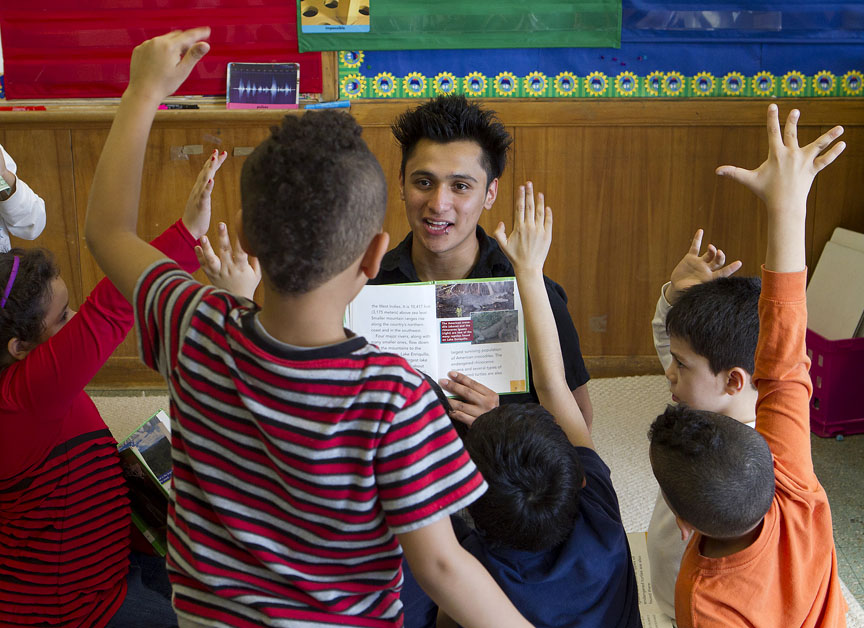PROVIDENCE, R.I. [Brown University] — For 25 years, the Howard R. Swearer Center for Public Service has worked to foster collaborations among students, faculty, and community partners to advance learning and scholarship and address social issues locally and globally. The Swearer Center will mark that milestone with a celebration on Monday, Sept. 24, 2012, at 5 p.m. at the Steel Yard in Providence. Brown University President Christina Paxson will be among those making remarks. Others include Roger Nozaki, director of the Swearer Center and associate dean of the college for community and global engagement; Clay Rockefeller, a 2003 Brown graduate and co-founder of the Steel Yard; Brent Kerman, principal of William D’Abate Elementary School; and Rafael Torres, a student at Alvarez High School.
“There are so many significant challenges we face locally, nationally, and internationally,” Paxson said. “An important part of an education is learning how to help find solutions to these issues. For 25 years, the Swearer Center has advanced this mission through its work connecting students and faculty to opportunities for public service.”
The center was founded in 1986 by Brown University President Howard Swearer, who believed that community engagement could be a powerful and formative part of a Brown education. Swearer sought to demonstrate Brown’s institutional commitment to public service and strengthen the linkages between community engagement and the academic work of the University. Brown was one of the first campuses nationally to establish a formal center for public service.
“We are so proud to see that our father’s vision of public service has spread and affected the lives of so many others,” said Nick Swearer, one of Swearer’s sons.
What began as a handful of programs and fellowships has blossomed over the last two and a half decades to encompass dozens of programs in advising, community partnerships, fellowships, and faculty engagement that offer both a range of learning opportunities and an interconnected set of approaches to community impact.
“Brown’s distinctive culture of community engagement and activism has been built over the decades by students, faculty, staff, alumni, and friends in communities near and far,“ Nozaki said. “The center’s history reflects the commitments and relationships of all those who have invested in this work over these 25 years.”
The Swearer Center’s advising efforts are aimed at getting students to think about the intersection of their academic work and community involvement beyond College Hill. One of the main advising programs is the University Community Academic Advising Program (UCAAP), which is designed to encourage first-year Brown students to embrace community participation and civic responsibility as central parts of a Brown education.
Community programs, which involved more than 700 Brown students last year, include a variety of offerings from literacy, science and math tutoring, to college preparatory programs, to homeless advocacy and prison-based arts workshops. Much of the Swearer Center’s community work takes place in local schools, where Brown student volunteers take part in tutoring, after-school and summer programs, assisting young students with literacy, math, science, the arts, sports and more. More than 400 Brown students spend time in Rhode Island public schools each week. The Swearer Center has 13 staff members based in the public schools across Rhode Island’s urban districts. More than 4,000 public school students will participate in Swearer Center programs across those districts this year.

“The Swearer Center is one of our biggest community partners,” said Nkoli Onye, executive director for performance management for Providence Public Schools. “It’s offering opportunities that our students would normally not be privy to. It’s changing kids’ lives by providing us with services that help to support and enhance and strengthen what we’re already doing.”
One such service is the College Advising Corps, which places Brown students and recent Brown graduates into high schools to work on increasing college attendance among low- and moderate-income high school students. Services include working on SAT preparation, essay writing, and financial aid programming. Onye said that she sees more and more students using the services of the College Advising Corps each year. “We’ve seen just a tremendous rise in the number of students who are accessing the college process. It’s just getting them really motivated and excited to think about their future.”
The Swearer Center also works with Brown faculty to advance teaching, research and scholarship, primarily through the Engaged Scholars Initiative. Projects range from a community garden partnership to the search for micro-organisms that can function as antibiotics. Twenty-two faculty across 17 departments have been supported with grants for course development and research through the Engaged Scholars Initiative. Last year, more than 600 students took courses supported by the initiative.
One of the main components of the Swearer Center’s mission has always been to integrate its community work into the Brown curriculum.
“In my three years of being involved with the Swearer Center, some of my biggest takeaways have been the ideas of relationship building, community building, co-learning, and looking at community work as a process of learning from people who might have a different background than you — working from the ground up, drawing on different ideas, and building relationships in the process,” said Priya Gaur, a Brown senior.
Brown was recently recognized for its commitment to public engagement and social innovation by being selected to join the Changemaker Campus Consortium by Ashoka U, a nonprofit dedicated to supporting universities and colleges that seek to be leaders in social change and social entrepreneurship education. As a member of the Changemaker Campus Consortium, Brown will receive Ashoka support, connect to its network of innovators, and share best practices.
“Brown’s open curriculum and outward-facing culture provide tremendous opportunities for integrating learning, scholarship, and social impact. We look forward to working with all our partners to continue advancing the ideal of the ’engaged university,’” Nozaki said.
For more information about the Swearer Center for Public Service and its programs, visit swearercenter.brown.edu.

